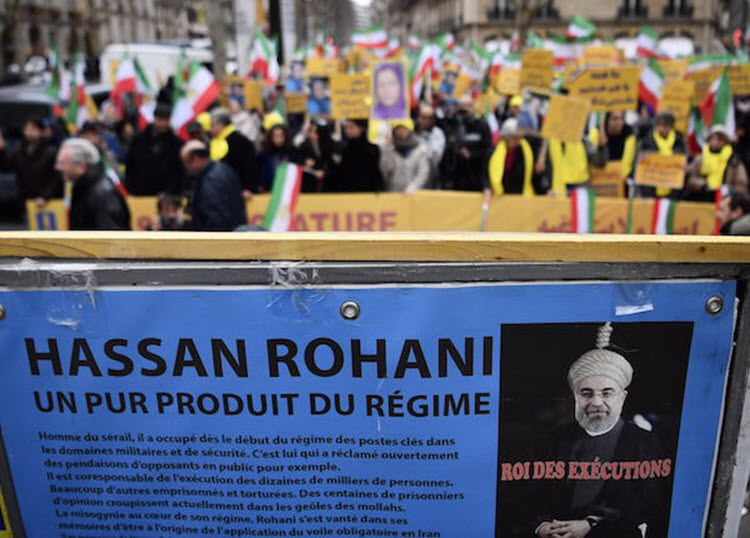
Iran Focus
London, 16 Jan – Donald Trump renewed the Iranian nuclear deal last week by extending overall sanctions relief for another 120 days and vowed that this was Iran’s last chance. There would be no more waivers. The deal either had to deliver on promised improvements, go through some serious changes, or he would pull the US out of the deal.
At the same time, the US issued targeted sanctions against people and entities for non-nuclear issues, like human rights.
One of those named of the new sanctions is Sadegh Larijani, the head of Iran’s judiciary, who has ordered his underlings to be especially harsh on current protesters (leading to 8,000 arrests and the threat of the death penalty).
Another is a Chinese network which helped Iran procure weapons.
These targeted sanctions are supposed to pressure the Iranian Regime over ongoing missile tests and its crackdown on Iranian protesters.
Treasury Secretary Steven T. Mnuchin said: “The United States will not stand by while the Iranian regime continues to engage in human rights abuses and injustice. We are targeting the Iranian regime, including the head of Iran’s judiciary, for its appalling mistreatment of its citizens, including those imprisoned solely for exercising their right to freedom of peaceful assembly, and for censoring its own people as they stand up in protest…We are also targeting Iran’s ballistic missile program and destabilizing activities, which it continues to prioritize over the economic well-being of the Iranian people.”
The ongoing protests are the biggest since 2009, and perhaps even 1979.
Maryam Rajavi, the president-elect of the National Council of Resistance of Iran (NCRI), wrote in The Wall Street Journal that the protests were motivated by “resentment toward the regime”.
It started over the cost of bread in Mashhad but quickly spread to 141 cities and morphed into an overarching anti-regime protest.
The corruption, human rights abuses, and international meddling are all inherent to the Regime. Therefore the only solution is Regime change.
Of course, the Regime has desperately attempted to point the finger at anyone but themselves.
Over the past four weeks, Regime members have unsuccessfully blamed the US, Zionists, Saudi Arabia, and the outlawed Iranian opposition Mujahedeen-E-Khalq (PMOI/MEK), which is the largest group in the NCRI.
So what’s next for the US policy on Iran?
Well Professor Raymond Tanter, a former senior member on the Middle East Desk of the National Security Council staff, advised that Trump’s negotiation deadline was a good one as simply pulling out of the deal would leave the US standing alone.
He further advised that Secretary of State Rex Tillerson negotiates a changed Iran deal with Europe, while National Security Adviser H.R. McMaster necessarily same thing with Congress.
Some modifications that would be especially positive:
• Automatic triggers that snap back Obama-era sanctions on Iran
• An end to the Sunset provisions which allow Iran to create nuclear weapons again in as little as 10 years
• Access for independent inspectors to Iran’s suspect sites, including nuclear ones
Tanter advises that Trump also reach out to Rajavi and other leading members of the Iranian opposition and acknowledge their role in bringing a Free Iran.
This support would discredit the Regime’s malign attacks, like calling them terrorists and ordering their assassinations.
Tanter wrote: “The United States should go even one step further than the French [- the NCRI resides in France] and build a stronger relationship with Rajavi’s movement, whose members make up more than 90 percent of all victims of political executions in Iran by the Iranian regime over the past three decades.”
He also advises a comprehensive strategy on Iran that goes beyond Trump’s December announcement.
He wrote: “For Trump’s national security strategy to make a difference, we have no choice but to incorporate consideration of human rights. The announcement on Jan. 12 by the Treasury Department designating key human rights violators of Iran, including the Judiciary Chief Sadegh Larijani, is a step in the right direction, which needs to be followed up with further such designations.”